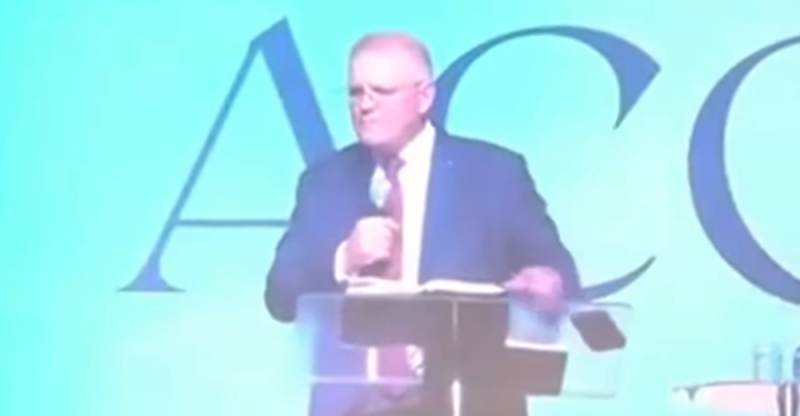Imagine if the Prime Minister was a hardline atheist giving speeches about political matters at an atheist convention that he or she wanted to keep from the wider public.
Imagine if the Federal Government were in the midst of drafting legislation that would have devastating impacts on religious communities.
Christian groups, other faith groups, the media and the public would be eager to know what such a Prime Minister had to say. And, so would the Rationalist Society.
Two weeks ago, my organisation made the decision to publish the video of Prime Minister Scott Morrison’s speech to the Australian Christian Churches conference, held earlier in April on the Gold Coast.
We published the video because it was overwhelmingly in the public interest to do so.
Australians, on the whole, are uncomfortable with extreme worldviews, whether they are religious or political ideologies.
We also like to think that the religious views of individuals won’t unduly interfere in government. But, even in our liberal democracy, it’s quite possible for a politician to be elected without them fully disclosing their worldview.
We have a right to know what ideas guide the actions and decision-making of those who stand for public office.
If a Christian political candidate believes planet earth was "created" a few thousand years ago and is eagerly awaiting the return of Jesus at the Apocalypse, voters have a right to know. Likewise, if a militant atheist candidate harbours ill-intent toward religious people, voters have a right to know.
Far too often religious views are deemed off-limits. In 2015, for example, then-Liberal candidate Andrew Hastie refused to answer questions about whether he believed in creationism, arguing that his religious views were irrelevant to voters.
Far from being irrelevant, the religious beliefs of political leaders are of great interest to Australians, as demonstrated by the public reaction to the video of Prime Minister Morrison’s speech.
There is a legitimate concern about how such beliefs may impact policy-making in the Morrison Government.
The Prime Minister has pledged to deliver a Religious Discrimination Bill to Parliament before the next election, even though the first two drafts drew widespread criticism from all quarters, including business groups, legal groups, human rights groups, LGBTIQ groups and even religious groups.
If either of those divisive draft bills had become law, religious people and organisations would have been provided a "sword" they could use to discriminate against and harm a wide range of people. Anti-discrimination laws are meant to be "shields", not swords.
While the vast majority of Australians, including many Christians, support the concept of secularism – the separation of church and state – it is not clear the Prime Minister feels the same.
In his maiden speech to Parliament, he went out of his way to argue Australia “is not a secular country”.
In response to the release of the video, it has have been heartening to hear public figures like Anthony Albanese and Kevin Rudd assert the importance of upholding a secular society that protects people of all faiths and none, and treats them equally.
Disappointingly, very few politicians speak up for secularism, even though Australia is a multi-faith and, increasingly, a non-religious society. With this year’s census expected to confirm a further decline in affiliation with Christianity, people increasingly want freedom from religion as well as freedom of religion.
The need for pro-secular champions in the community and in politics is becoming increasingly important, as religious institutions maintain and seek to enhance their privileged place in government institutions.
For example, in parliaments and councils across the nation, non-Christian representatives – atheists, agnostics and people from minority faiths – are forced to observe exclusively Christian prayers before getting down to their daily work of representing their constituents.
In the military and schools, government-funded pastoral care is reserved almost exclusively for the Christian religion, despite the fact that government schools are mandated as secular and the vast majority of recruits into our armed forces are now non-religious.
As Australia’s oldest freethought organisation that promotes reason and evidence as the basis for policymaking, the Rationalist Society of Australia will continue to inquire into the beliefs of this country’s political leaders. We will, unwaveringly, continue work to advance the cause of secularism.
Meredith Doig is President of the Rationalist Society of Australia and writes a daily bulletin called 'RSA Daily'.












